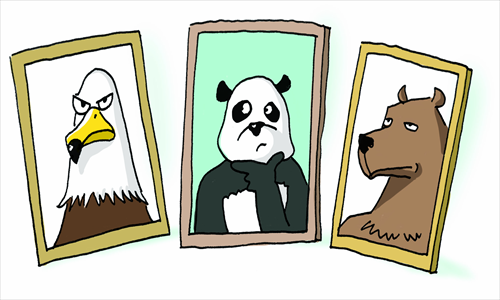Public misconceptions may sour Sino-Russian cooperation efforts

Illustration: Liu Rui/GT
In recent years, it has been common to hear suggestions of China allying with Russia, particularly when tensions rise in China-US relations. A few Chinese people do think it is possible for China to unite with Russia against the US. But what interests me more is that every time the perception is raised, it is confronted by strong opposition and criticism domestically. I realize that the Chinese public, especially the elite, has more animosity for Russia than for the US.
Several reasons are commonly cited for this animosity. For instance, posts about Russia occupying more than 1.5 million square kilometers of Chinese territory can be found easily on the Internet and some cite the number of over 3 million square kilometers. In history, Russia showed extreme greed and a lack of creditability in dealing with China. Besides, Russia still sometimes deals with China without showing sufficient respect on some specific issues.
In comparison, the Chinese are more impressed by the US as it worked side by side with China to fight against Japan during WWII, and the image of American Volunteer Group were more favorable than Soviet Red Army. Besides, it is widely known in China that the US' Boxer Indemnity funded the establishment of Tsinghua University and helped China build the Peking Union Medical College Hospital.
Such examples appear to be convincing and have shaped many Chinese people's feelings about Russia and the US. But this is misleading.
The modern history of China is full of humiliations and has implanted deeply in Chinese people the idea that China has to grow stronger as lagging behind leaves one vulnerable to attacks. To do this, it needs to face up to the reality and future.
There are some facts that need to be stressed in Sino-Russian relations.
First, the two countries have no territorial disputes as all border issues have been addressed. This is a fortunate result for two neighbors that share a border that is over 4,000 kilometers long and has laid a sound foundation for China-Russia amity.
Besides, currently Russia has been strategically disadvantaged by the West. Russia's frictions and conflicts with the West have created more room for China's maneuvers on the international stage. In the geopolitical contest, the two neighbors need and have the will to depend on each other.
In the foreseeable future, China and Russia have no ambition to battle each other both geopolitically or ideologically. Russia particularly hasn't got the strength to underpin such an ambition. The balance of power between China and Russia is undergoing a shift that can hardly be reversed.
Moreover, despite interdependence, China and Russia also exercise vigilance against one another. China's precautions are sometimes subject to emotional factors while Russia's are based on realistic considerations. It is an urgent matter for China to dissolve Russia's vigilance.
Against this backdrop, it is fair to say that China and Russia still need to enhance their strategic cooperation. Domestic public opinion should be on guard against the tendency of demonizing Russia, which can deteriorate the social consensus bolstering Sino-Russian cooperation and ultimately harm China's national interests. We need to avoid diplomatic options being hamstrung by preconceptions.
Uniting with Russia is not to counter the US, but instead could help form more stable Sino-US relations. Worries that US may be displeased by China-Russia intimacy are unnecessary. On the contrary, a stable Sino-Russian relationship will compel the US to have more respect for China's national interests. Otherwise, both China and Russia will lose their weight in US diplomacy.
No matter what, all countries aim to safeguard its own national interests. The US has its ambition to finally Westernize China. Overtly refusing to acknowledge China's political system, it tries sophisticated means with missionary-like persistance to promote the evolution of the Chinese system toward a Western liberal democratic model, but gives no care to the tumult that may be caused. The White House cannot care more about the well-being and human rights of Chinese people than the Communist Party of China. We have to be aware of that.
The Sino-US relationship is more complicated than that between China and Russia while there is similar complexity between Russia and the US. In this triangle, China is not at the worst position. To take initiatives, China has to firmly maintain the China-Russia strategic relationship and refrain from squaring off with the US.
The author is deputy editor-in-chief of the Chinese edition of the Global Times. opinion@globaltimes.com.cn